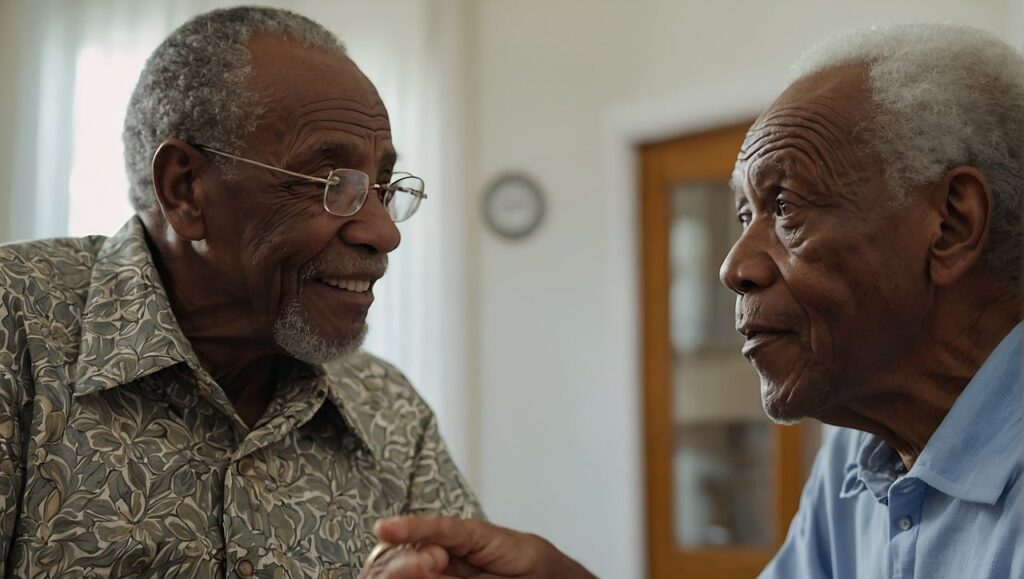Caring for someone with dementia can be an emotional and challenging journey. With over 900,000 people living with dementia in the UK alone and the number is expected to rise significantly in the coming years, which is why many families are seeking guidance on how to best support their loved ones. This article will explore what dementia is, its common types, symptoms, and stages, and offer practical advice for families on how to support someone with dementia effectively.
What is Dementia?
Dementia is an umbrella term for a group of progressive neurological conditions that affect the brain’s ability to function properly. It primarily impacts memory, thinking, problem-solving, and language. As the condition progresses, it can affect daily living and relationships, making it important for family members to understand the condition and how to offer the best support.
Common Types of Dementia
Dementia manifests in different ways depending on the type. The most common forms include:
- Alzheimer’s Disease: The most common type, accounting for around 60-70% of cases. It is characterised by the gradual decline in memory and cognitive abilities.
- Vascular Dementia: Caused by reduced blood flow to the brain, often following a stroke. Symptoms may appear suddenly and vary depending on the areas of the brain affected.
- Lewy Body Dementia: Often marked by hallucinations, sleep disturbances, and issues with movement, this form of dementia is caused by protein deposits (Lewy bodies) in the brain.
- Frontotemporal Dementia (FTD): Primarily affects the frontal and temporal lobes of the brain, leading to changes in behaviour, personality, and language.
Understanding the type of dementia your loved one has can help in developing more effective coping strategies and care plans.
Recognising the Symptoms of Dementia
While memory loss is often associated with dementia, it’s not the only symptom. Some common signs to look out for include:
- Memory problems: Forgetting recent events or conversations.
- Difficulty with communication: Struggling to find the right words or follow conversations.
- Changes in behaviour: Apathy, irritability, or sudden mood swings.
- Difficulty performing familiar tasks: Struggling with routine activities like cooking or managing finances.
- Confusion about time and place: Forgetting where they are or how they got there.
- Poor judgment: Making decisions that seem out of character.
Early recognition of these symptoms can lead to timely intervention and support. If you notice these signs in a loved one, it’s important to seek a dementia diagnosis from a healthcare professional.
Understanding the Stages of Dementia
Dementia typically progresses in stages, with each phase presenting its own set of challenges:
- Early Stage: In the early stage, memory loss and cognitive decline are mild. Individuals can often function relatively independently, but they may start forgetting names, appointments, or misplacing items.
- Middle Stage: In this stage, memory loss becomes more pronounced. Changes in behaviour due to dementia, such as frustration or confusion, become more evident, and individuals may need help with daily activities like dressing or eating.
- Late Stage: This stage of dementia often involves severe cognitive decline. Individuals may lose the ability to communicate effectively, struggle to recognise loved ones, and require full-time care for their physical and emotional needs.
Knowing these stages can help families plan for the level of care and support their loved ones will need as the condition progresses.
How to Support Someone with Dementia

Supporting a person with dementia requires patience, understanding, and a person-centred care approach. Here are some practical tips for providing effective support:
1. Encourage Independence
While it may be tempting to take over tasks, it’s crucial to allow your loved one to maintain as much independence as possible. For example, you can break down activities like dressing or eating into smaller, manageable steps. Encouraging them to engage in daily routines can help boost their confidence and slow the progression of dementia.
2. Create a Dementia-Friendly Environment
A dementia-friendly community or home environment is essential. This means making adjustments to their living space to ensure safety and comfort. Simple changes like labelling drawers, using visual cues, and removing hazards can create a supportive setting for someone with dementia.
3. Establish a Routine
People living with dementia often benefit from a structured routine. Routines provide predictability and reduce confusion. It’s important to include regular times for meals, exercise, and rest to help your loved one feel secure.
4. Use Effective Communication Strategies
Communication can become increasingly difficult as dementia progresses. Here are some tips for maintaining effective communication:
- Speak slowly and clearly.
- Use simple, short sentences.
- Maintain eye contact and offer a calm presence.
- Avoid arguing or correcting (focus on validating their feelings instead).
- Use visual aids or gestures to supplement verbal communication.
These strategies can reduce frustration and foster a sense of connection.
5. Offer Emotional Support
Living with dementia can be overwhelming, both for the individual and their carers. Understand that changes in behaviour due to dementia, such as mood swings or aggression, are part of the condition, not a reflection of their true feelings. Offering empathy and reassurance can help ease their distress.
6. Implement Coping Strategies for Dementia
Developing coping strategies for dementia is key to managing daily challenges. These might include:
- Memory aids: Using calendars, sticky notes, or digital reminders to help with tasks.
- Sensory activities: Engaging in activities like listening to music, gardening, or painting can stimulate the senses and provide comfort.
- Exercise: Physical activity can improve mood, reduce agitation, and help maintain mobility.
Impact on Families and Carers

Caring for someone with dementia can place emotional, physical, and financial strain on families. It’s important to acknowledge the emotional impact of dementia on both the individual and their carers. Carer support, such as respite care or joining a support group, can provide much needed relief.
Understanding denial in dementia diagnosis is also critical, as families may struggle to accept the changes in their loved ones. Open discussions with healthcare professionals, as well as seeking emotional and practical support, can help manage these difficult emotions.
5 Signs it’s Time for Respite Care
The Importance of Dementia-Friendly Communities
A dementia-friendly community is vital in supporting those living with the condition. These communities raise awareness about dementia, provide inclusive services, and create safe spaces where individuals with dementia can feel understood and supported.
In addition to community resources, professional dementia care services play a crucial role. Whether it’s in-home care or a specialised dementia care facility, person-centred care ensures that the individual’s unique needs and preferences are prioritised.
Supporting Someone with Dementia, Concluded
Supporting someone with dementia involves understanding the condition, recognising its stages, and adopting person-centred care strategies. By encouraging independence, creating a dementia-friendly environment, and using effective communication techniques, you can help your loved one live with dignity and maintain a sense of self.
Remember, you don’t have to go through this journey alone. Reach out to local dementia support services, carers’ groups, and healthcare professionals to get the help you need.
If you are looking for more advice on how to support someone with dementia, contact our care team for personalised guidance and care options.
Finding the Right Care Home
Finding the right care home for a loved one with dementia is a critical decision that requires careful research and consideration to ensure they receive the best possible care in a supportive and compassionate environment.
Starting this search sooner, rather than later is also important so you are prepared when your loved one reaches the stage where further support like a residential home is required. Having this discussion early on also allows you to talk to your loved one about their wishes for a care home, allowing them to have some autonomy over the situation.
Some things to consider when looking for the right care home might include:
- Considering the long-term needs of your loved one to avoid the need to move care homes
- Somewhere accessible for the family to visit
- Reviews from families of residents, as well as official documents such as the Care Quality Commission report for the home
- Visit the facilities – Are the staff friendly? Does it offer good activities? Is there a sense of community? Are the facilities high quality? Can the home meet the medical, physical, and emotional requirements of your loved one?
Find a comprehensive guide for choosing the right Dementia care home for your loved one written by our experts here.
Specialist Care Homes & Dementia Homes on the South Coast
Splendid Healthcare is a leading UK provider of dementia care on the South Coast. Our compassionate and highly trained team of caregivers and healthcare professionals are committed to upholding the highest standards of care, ensuring that each individual receives personalised support tailored to their unique needs and circumstances.
Our professionals are on hand to discuss your loved one’s dementia care and the supportive, caring environment that our homes can offer. Contact one of our friendly team today to find out more about our care homes in West Sussex.
Find a Home:




